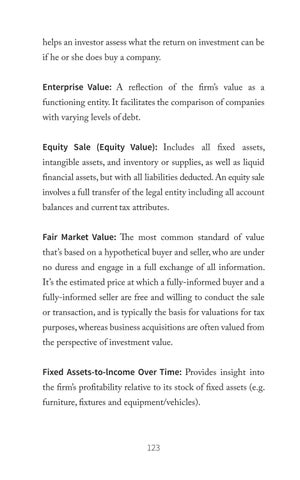helps an investor assess what the return on investment can be if he or she does buy a company.
Enterprise Value: A reflection of the firm’s value as a functioning entity. It facilitates the comparison of companies with varying levels of debt.
Equity Sale (Equity Value): Includes all fixed assets, intangible assets, and inventory or supplies, as well as liquid
financial assets, but with all liabilities deducted. An equity sale
involves a full transfer of the legal entity including all account balances and current tax attributes.
Fair Market Value: The most common standard of value that’s based on a hypothetical buyer and seller, who are under
no duress and engage in a full exchange of all information. It’s the estimated price at which a fully-informed buyer and a
fully-informed seller are free and willing to conduct the sale
or transaction, and is typically the basis for valuations for tax purposes, whereas business acquisitions are often valued from the perspective of investment value.
Fixed Assets-to-lncome Over Time: Provides insight into
the firm’s profitability relative to its stock of fixed assets (e.g. furniture, fixtures and equipment/vehicles).
123









